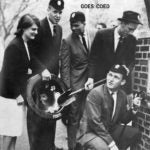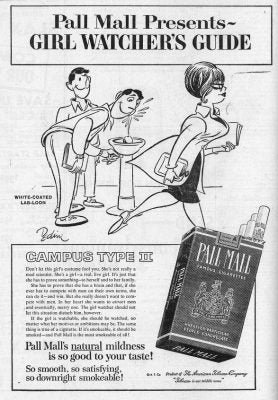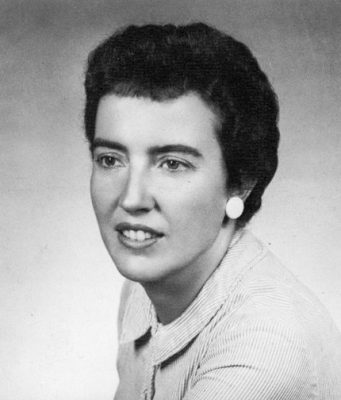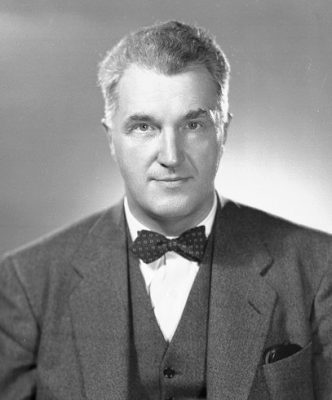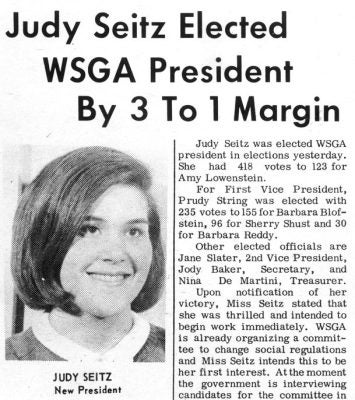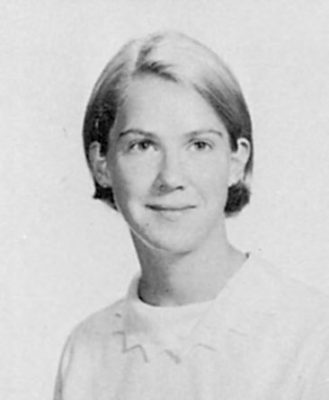| Name/Origin | Quotation | Picture |
|---|---|---|
| Sally Mae Schwartz Friedman, 1960 B.S. in Ed. | I have strong memories of being female at Penn. One of the most vivid: Houston Hall, the student union presumably for one and all, where one huge room was reserved for males only! I can recall standing wistfully at the door of that room listening to someone playing the piano, and never questioning why I couldn’t enter. How bizarre that seems now! And how wonderful that when my daughter entered Penn in 1982, such strange rules didn’t exist. | |
| Elizabeth Carter Seeley, 1960 B.S. in Econ. | I remember the faculty as being more hostile than the male students, but I don’t believe that the students took us seriously. Still, it was a tremendous advantage to be exposed to ideas and people and the kind of energy which was then almost exclusively available to the men in our culture. I felt as if I had the best of both worlds. … I don’t think that there could have been an educational experience anywhere at that time which would have prepared us for the modern world better than Penn did. | |
| The Daily Pennsylvanian, 1962 | “The wild, creative attitude is gone,” said one junior editor. “When we wanted to curse, we could. Now it’s all different. … I have noticed a marked tightening-up of the laxity, or rather the informality, that is part of the spirit of The Daily Pennsylvanian. Daily buffoonery, a long tradition of the features department, was squelched. … Yes, women should definitely clean up the features room.” | |
| Advertisement, The Daily Pennsylvanian, 1962 | She’s a girl-a real, live girl. It’s just that she has to prove something-to herself and to her family.
She has to prove that she has a brain and that, if she ever has to compete with men on their own terms, she can do it-and win. But she really doesn’t want to compete with men. In her heart she wants to attract men and eventually marry one. The girl watcher should not let this situation disturb him, however. If the girl is watchable, she should be watched, no matter what her motives or ambitions may be. The same thing is true of a cigarette. If it’s smokeable, it should be smoked-and Pall Mall is the most smokeable of all! |
|
| Constance P. Dent, Dean of Women, 1961-1966 | The matter of senior women students living in apartments in this area also gives rise to questions about physical safety. Increasing travel in lightly traversed areas, increasing the number of women students on the street at later hours, and the mere presence of women students in widely scattered, remote and unsupervised areas would increase the likelihood of undesirable incidences occurring. Also the matter of a supervised diet is an important health consideration. A diet dictated by economy is not always the best. | |
| Irma Spritz Lustig, 1963 Ph.D. | I’m sort of glad that I didn’t just do things the traditional way – that I had to be innovative, that I had to be imaginative, that I had to think of things, that I went out and I also got some of the world’s work done. | |
| Gaylord Probasco Harnwell, President of Penn, 1953-1970 | Since women entered higher education as fully participating members in its activities, they have had a most salutary effect, regardless of those who thought it would be as dangerous as opening that most solid citadel and refuge of the male at bay, his club, to women. | |
| Gaylord Probasco Harnwell, President of Penn, 1953-1970 | Educators, like women themselves, are attempting to discover in what way women’s education is related to her function to society, particularly in regard to what may be required of her in the modern milieu. John Dewey’s idea that education should put pressure on life is particularly applicable as far as women are concerned. | |
| Judith Seitz Rodin, 1966 B.A. | Many women felt segregated and unequal at the University in the 1960s. Penn had had women at the University for a long time.there were significant differences between the College and the College for Women in terms of opportunities and equal access. I had made the choice not to go to an all-women’s college and a lot of women in the College were feeling that, de facto, we were in an all-women’s college. | |
| Judith Seitz Rodin, 1966 B.A. | A university must be a free and responsible community of scholars in teaching and in research. History teaches us that our commitment to excellence must go hand in hand with our commitment to openness, accessibility, and diversity, especially in education. For in a democracy, education is the most essential avenue of opportunity for people. | |
| Judith Seitz Rodin, 1966 B.A. | Get in someone’s way. Don’t whisper your story. Shout it. And be willing to stand your ground. | |
| Ernesta Ballard, 1967 B.A. | I was very involved in Penn athletics, playing both field hockey and lacrosse at a time when women weren’t taken seriously as athletes. Women’s sports, except for swimming, were considered hobby clubs. I didn’t even think to complain or object; it was just a given we’d receive no support or recognition (…) It’s too bad it took schools and colleges so long to recognize that girls strive and compete just as boys do; fortunately, that social inequity is behind us. | |
| Gwendolyn S. Gain, 1967 B.A. | Seventeen years ago at the age of 17, I turned my back on College Hall and the statue of Ben Franklin for what I firmly intended to be forever, renouncing the academic life in general and the University of Pennsylvania in particular…Today I happily, if often frenetically, juggle three occupations, each of them fascinating and rewarding: housewife and mother of four; part-time student in the College of Women; secretary to Mrs. Virginia Henderson, who is director of the new program for encouraging the return of mature women to college. | |
| Gwendolyn S. Gain, 1967 B.A. | I have seen my own growing self-confidence and sense of belonging reflected again and again in the faces and voices of the other women in our ranks. We have had two teas for the purpose of getting acquainted with each other and exchanging problems and attitudes, and it is always the same story: “I travel over a hundred miles on the train to get here, but it’s worth it,” or “My husband says I’m better-natured since I’ve come back to school,” or “My little girl had her appendix out two days after the semester began, but somehow I managed to survive it, and I’m doing fine.” | |
| Bruton Committee Report, 1967 | Acceptance of the current philosophy of integration and equality of the sexes does not obliterate the fact that women, as women, do have some significant problems and interests. |
Women at Penn: Quotations 1960-1969
Dedicated to the memory of Ruth Branning Molloy, B.S. in Ed. 1930



